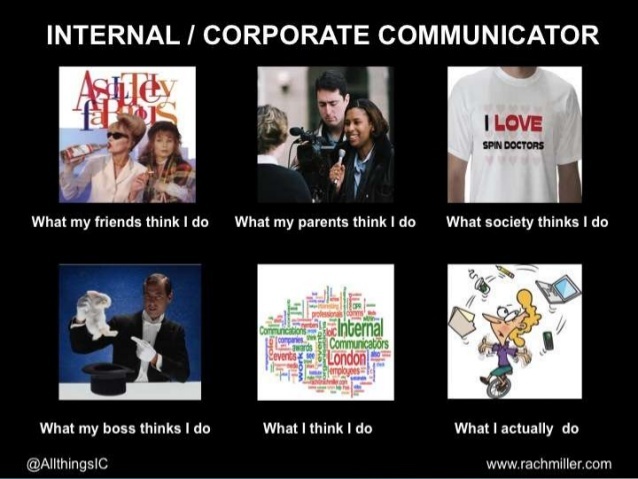
By now, we’re sure you’ve read, or at least come across, that Cosmopolitan article.
You know – the one which whittled down the vibrant, eclectic, high-pressure, critical role of the internal comms professional to simply ‘organising people’s birthday cakes’. Yes – that one.
The now-infamous article had many an internal communicator up in arms after it was published, and rightly so. While its disparaging jabs at the profession may have been meant in jest (as has since been ostensibly confirmed by Cosmopolitan editor-in-chief Farrah Storr), for an industry which is still struggling to assert itself as a crucial, game-changing function within organisations – it certainly didn’t do us any favours.
There’s been many a misconception batted around as to what the role of an internal communications professional actually is. The Cosmopolitan article is just the latest in a long line.
But as internal comms experts who work with clients across the globe to devise and implement exciting, compelling, and inspirational IC programmes, we know just how crucial internal comms can be to an organisation, and how it can truly enhance organisational productivity and success. And any internal communicator worth their salt won’t need to be convinced of that either.

What matters is that we show those upon whom internal comms could have a lasting positive impact just how valuable it can be.
While there is evidence that those at the top are starting to cotton on to the real value IC can bring to an organisation, we’ve still got a long way to go before it becomes a fully respected cog in the workplace machine.
We want to do our bit to propel IC to this final, exciting destination.
And who better to quash the damaging assertions about the role of internal communications that Cosmopolitan put forward than those at the heart of the daily cut-and-thrust themselves?
So we asked 12 internal comms professionals two simple questions:
1) What does an internal comms professional actually do?
2) What value do you think IC brings to an organisation?
Here’s what they said:
What does an internal communicator actually do?
Martin Flegg,
Chartered Internal and Change Communications Specialist
As one of two internal comms professionals at the University of Bradford, I’m responsible for all staff communications and some student communications. My job is very varied and wide-ranging. Quite a bit of it involves keeping the internal communications lights on – so that’s maintaining and updating our intranets and student portal, curating useful content, and editing and distributing our weekly staff briefing and other regular change-related bulletins.
I also provide internal comms expertise and advice on a large number of projects across the university. At the moment, I’m involved in implementing IT improvements, organisational restructures, and changes to the courses as well as expanding our research functions, amongst others. In recent months I’ve often been juggling over 50 projects at once, including a range of internal communication improvements, which means there’s never a dull moment!
I’ve always thought that part of being a successful IC practitioner is deciding where to invest your time and expertise to achieve the biggest impact. This might include conducting a sizeable amount of research and insight, strategic and tactical planning, drafting, content creation, implementation and evaluation for big projects, or a subset of these for smaller activities.
LinkedIn: Martin Flegg Twitter: @martinflegg
“In recent months I’ve often been juggling over 50 projects at once”
Hamida Bhatia, Internal and Change Communications Coach
As practitioners, we engage and connect people by building and communicating authentic, compelling organisational narratives, creating meaningful relationships, and – perhaps most critically – acting as the friends of the front-line!
LinkedIn: Hamida Bhatia
Amit Joshi, Communications and PR Manager
I agree with Hamida. I would add that internal comms professionals also have to ensure the tools and content they use to communicate with employees are interesting and engaging. Let’s be honest – how many employees/internal stakeholders actually read a newsletter? If we aren’t being transparent and engaging, then whatever we try to communicate will never have the desired result. As IC practitioners, we need to stay on our toes and deliver engaging content using channels that are best suited to the stakeholder.
Twitter: @lordamitjoshi LinkedIn: Amit Joshi
Helen MacBain, Head of Marketing and Communications
As it happens, I was recently talking with someone about Yammer, and how the starting point for engaging the people there is to figure out what their biggest problems are and provide a feasible solution – which sums up the internal communicator’s role nicely in a nutshell! They help teams and organisations solve annoying problems with better and novel communications ideas and techniques. For example, the age-old problem of too many emails. Easily solved with the right IC know-how and by helping people to change their attitudes and behaviours to get on board with new ideas, practices and innovations. As such, I guess internal comms enables behaviour change too.
LinkedIn: Helen MacBain
“Internal comms professionals help teams and organisations solve annoying problems with better and novel communications ideas and techniques”
Eric Bruggeman, Communications and Employee Engagement Keynote Speaker, Founder of Employee Talk LLC
Internal comms professionals continuously focus people on what is critical in the organisation. There can be a fine line between distributing the right amount of information to employees, and way too much, so you have to tread this line carefully when preparing comms. I break communication down and focus on three areas; internal communication objectives, external communication objectives, and obstacles to change and development.
LinkedIn: Eric Bruggeman ET IV
Shweta Midha, Communications and Alumni Engagement Manager
The role of an internal communications professional is highly specialised. They enable the free-flow of effective, advantageous two-way communication within an organisation. They segment their audience (the organisation’s employees) into various subgroups, identify which channels work best for which subgroup, and customise information so that messages are effectively communicated and resonate with people. And they enable honest feedback channels to management, so that they too are well-informed and can adequately respond to employee needs and concerns.
Twitter: @shweta_midha LinkedIn: Shweta Midha
Clare Holman, Head of Consultancy and Learning
When I worked as an internal comms professional before setting up shop at H&H, in a nutshell I spent a great deal of my time listening, advising, challenging, ‘holding up a mirror’, writing, coaching, and building consensus. Working with people across the organisation to make voices heard, solve problems, and capture hearts and minds through inspiring and engaging communications and content. As well as upskilling people to adapt to change, and ensuring they always knew what was happening, what the outcomes were going to be, and how they could really make a difference.
LinkedIn: Clare Holman
“As an IC practitioner, I spent a great deal of my time listening, advising, challenging, ‘holding up a mirror’, writing, coaching, and building consensus”
Charlotte Sahami, Strategic Communications Manager
Internal communicators play an integral part in helping a business achieve its goals, through employee engagement and empowerment. They build and maintain the organisation’s culture and internal brand through exciting communications and engagement activities, and play a vital role in staff retention and satisfaction.
LinkedIn: Charlotte Sahami
Liga Karklina, Founder, Creative Art
There are many ways to engage people with the organisation – and it’s up to internal communicators to find the best and most ingenious ways to build an authentic, meaningful connection. In every piece of communication (and there’s a hefty amount of them), always keeping in mind the organisation’s values, the right tone of voice, reminders of milestones achieved and those still lying ahead – this is the magic that internal comms teams are responsible for every day! As well as embedding the organisation’s “spirit” into absolutely everything that’s said and done. The key is executing it in a seamless manner which makes the internal comms process look unquestionably natural. This is possibly one of the reasons why it is a mystery for the rest…
Twitter: @liga_tweet LinkedIn: Liga M. Karklina
“Internal communicators find the best and most ingenious ways to build an authentic, meaningful connection between employees and their organisations”
Anonymous
Some companies still lump IC together with other departments – like PR and marketing – which can be detrimental to its reputation, meaning it doesn’t get the airtime it needs. And quite a few times, when a particular project doesn’t seem to fit within the remit/capabilities of another department, it’s left for the internal comms professionals to sort out. This certainly makes for a varied job experience some days – if not always an entirely relevant one! It also leads to confusion across the wider organisation. If I had a pound for every time someone asked ‘so what is it you actually do?’…
But once the wider organisation ‘get’ IC, they tend to open their eyes to just how beneficial it can be. And as for what the role of internal communications actually involves – well, where to start! You tend to be one of the first to know about things, so you always have to be on the ball. And this prior knowledge can be very useful for other departments, in terms of strategy, forward planning, and events for example. We also tend to be far more refined personality-wise – as we have to listen to, understand and communicate with people across the organisation, so brilliant people-skills are a must. And you need to have a constant acute understanding of the broader organisation too. I haven’t come across any IC functions that have been siloed, which can be seen in other departments – much to their detriment!
So internal comms professionals are certainly #busybusyverybusy indeed… and not a birthday cake in sight!
But of course, the wider question is – why should senior leaders invest in internal comms in the first place?

The IC folks had a lot to say on this too – here are their responses:
What value do you think IC brings to an organisation?
Hamida Bhatia, Internal and Change Communications Coach
You’ll find there’s no single definition of internal comms! For me, it’s about enabling organisations to communicate with their people in ways that keep them engaged and inspired throughout their experience, building a strong emotional connection and aligning them with the vision.
LinkedIn: Hamida Bhatia
Martin Flegg, Chartered Internal and Change Communications Specialist
For me, internal comms is fundamentally about connecting people with their organisation and with their colleagues, and enabling the organisation to achieve its objectives by facilitating meaningful conversation. What it certainly isn’t about is ‘SOS’ – Sending Out Stuff!
LinkedIn: Martin Flegg Twitter: @martinflegg
“What internal comms certainly isn’t about – is Sending Out Stuff!”
Charlotte Sahami, Strategic Communications Manager
In the simplest terms, internal comms constitutes a crucial two-way voice for all staff members, from the senior leaders down to the front line. This enables employee problems to be aired and resolved, senior leaders to keep all employees in the loop about what’s happening in the organisation, and employees to be more engaged and invested in their work and their organisation’s mission.
LinkedIn: Charlotte Sahami
Pippa Griffin, IC Consultant
IC is critical because people pull harder together when they’re aligned, know where the organisation is going, and crucially, understand why and how they can make a difference to its success. To get a feel for just how important internal comms is, I think it’s good to reverse the question and ask – what if IC wasn’t there? How would people know what was going on? Osmosis? Gossip at the water cooler? Rumour? How would they understand what was being said? And how would they know that what they were doing actually counted towards something?
Internal comms – and those who work in it – are the glue that binds team to team, leaders to employees, and the people to their organisation. But to me, to drive a real improvement in an organisation’s performance, truly enhance the culture, or make real change happen, it’s not enough just to ‘communicate’. To truly engage people, you need to give them the opportunity to feel, to contemplate, to explore those messages; you need to engage hearts and minds; and you need to answer the crucial question ‘what does that mean for me?’. This is what the role of internal communications is really about. It’s much more than just communicating – it’s making sure every message has the best possible impact!
LinkedIn: Pippa Griffin
“To get a feel for just how important internal comms is, I think it’s good to reverse the question and ask – what if IC wasn’t there? How would people know what was going on? Osmosis? Gossip at the water cooler? Rumour? How would they understand what was being said? And how would they know what they were doing actually counted towards something?”
Liga Karklina, Founder, Creative Art
I personally consider internal comms as a means of nurturing and strengthening organisational culture. It’s not so much WHAT is done, but HOW it is done. To get employees to truly believe in the work they’re doing and the purpose they’re doing it for, you have to ensure that the organisational culture not only accommodates all the employees as a great fit, but is also understood by and resonates with them too. An organisation without a strong culture is like a word without a definition.
Twitter: @liga_tweet LinkedIn: Liga M. Karklina
Dr. Frederic Morrison, Lecturer in Communication
Internal comms should be an essential component of any organisation. It is a key element in the coordination and implementation of key strategic goals. In addition, internal comms is two-way – which enables more meaningful, equitable conversations – and constitutes a fundamental approach to an organisation’s knowledge management. Thus, it’s a primary driver of organisational innovation and adaptation to change.
LinkedIn: Frederic Morrison
“Internal comms is a primary driver of organisational innovation and adaptation to change”
Clare Holman, Head of Consultancy and Learning
IC helps organisations to communicate clearly and compellingly about where they’re going, why they want to go there and how they plan to get there. It’s the function through which they get to tell their story and inspire their people. It creates opportunities for people to form a connection with the organisation’s strategic direction. Without that, there’s no understanding about how to get involved, no motivation to make a meaningful contribution, and no shift in behaviours as the organisation evolves and grows.
The importance of internal comms is likely to continue increasing as organisations learn to adapt more rapidly to changing circumstances, whether that be the economic and political climate, technological advances, or competitor activity, not to mention the changing expectations that employees have about their work today. Change is now a constant, and it makes the job of engagement tougher than ever before. Ultimately, internal comms has a critical part to play is helping organisations to flourish in this constantly evolving environment.
LinkedIn: Clare Holman
Shweta Midha, Communications and Alumni Engagement Manager
As well as empowering the employee voice within organisations and connecting people with their organisation’s purpose and vision, internal comms also plays a vital role in crisis management. A well-informed workforce is disaster-ready. Change can also be more effectively and easily implemented in organisations with the help of consistent compelling and inspirational internal comms.
Twitter: @shweta_midha LinkedIn: Shweta Midha
“Change can be more effectively and easily implemented in organisations with the help of consistent compelling and inspirational internal comms”
This is only a small selection of the internal comms professionals out there connecting and inspiring people and organisations the world over.
And we think it’s safe to say – that the role of internal communications is much more eclectic, interesting, and valuable than Cosmopolitan gave it credit for.
It’s not just people wearing hands-free headsets with the impeccable appearance of a LinkedIn profile photo. It’s people doing truly inspiring things, often with frugal budgets.
So don’t you think it’s time that they – and the industry as a whole – got the involvement and recognition they deserve, in every organisation across the globe?
Get in touch today to find out how we could help you transform your leaders and managers from average, to exceptional!
Got a brilliant idea you simply can’t keep to yourself?
We’re always looking for fresh faces to help us further the IC conversation by writing guest articles for our blog. If you want to make your voice heard on internal comms, employee engagement, change management or leadership development, we’d love it if you got in touch!












